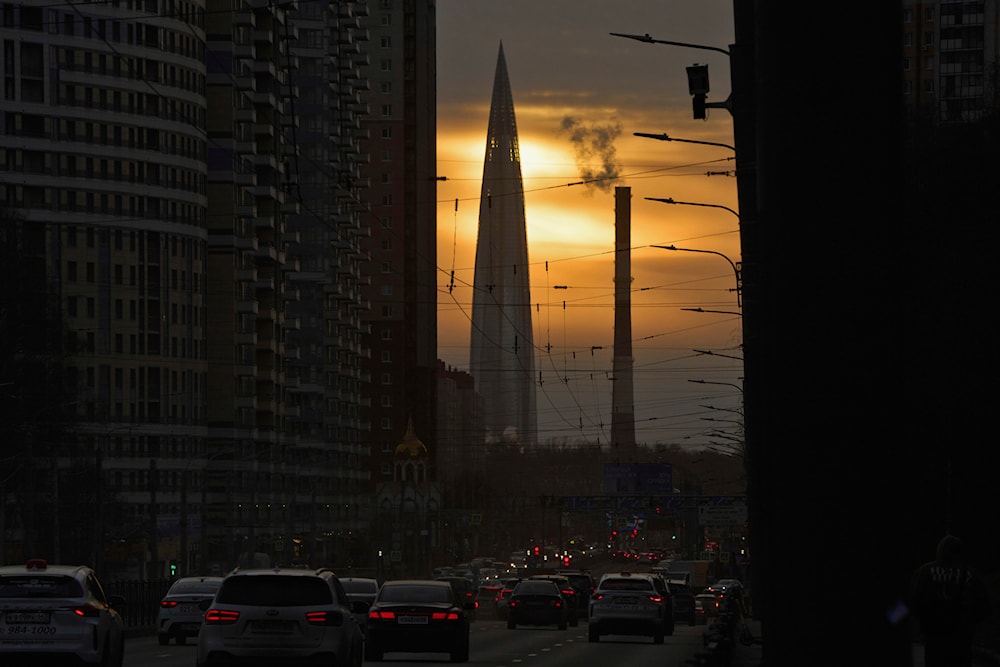Turkiye obtains sanction waiver from US to buy Russian gas
The sanction waiver was initially granted to Turkiye in December of 2024, as Russian gas imports provided more than 45% of Ankara's gas needs.
-

The Lakhta Center skyscraper, the headquarters of Russian gas corporation Gazprom, is seen during sunset in St. Petersburg, Russia, Sunday, March 9, 2025 (AP)
The United States has agreed to extend a sanction waiver that would allow Turkiye to buy gas from Russia all the way until May, Bloomberg reported on Thursday, citing a Turkish official.
The three-month exemption given to Turkiye was going to expire on March 20, after Turkiye obtained the initial sanction waiver in December of 2024, following a series of talks between Turkish Energy Minister Alparslan Bayraktar with US officials.
The Turkish Treasury and Finance Minister Mehmet Simsek and US Treasury Secretary Scott Bessent spoke on the phone and discussed "sanctions, as well as other economic and national security issues of mutual concern,” according to a statement published by the US Treasury Department.
With more than 45% of the country’s gas imports coming from Russia last year, as calculated by Bloomberg using data from the national energy regulator, and those supplies proving crucial during a colder-than-usual winter while remaining important in the summer due to an expected decline in hydropower generation, their role in the nation’s energy landscape continues to be significant.
With the US imposing sanctions in November on Gazprombank, a financial institution crucial for energy payments, to tamp down on Russia’s gas revenues and major importers Turkey and Hungary later receiving exemptions, the impact of these measures became more nuanced.
This comes amid intensified diplomatic efforts between Russia and the United States, with the US heralding a 30-day ceasefire for the war in Ukraine, while Russia looks into relieving some of the sanctions it faces as a result of the three-year-long war.
Russia asks corporations about sanctions
Russia sought input from corporations to determine which sanctions should be prioritized for removal ahead of talks with Washington, following Ukraine’s approval of a 30-day ceasefire in exchange for the resumption of U.S. military and intelligence aid, Reuters reported on March 13, citing two Russian business figures.
Russia's industry and trade ministry, according to two sources within the industry, has been reaching out to companies with a request to specify which sanctions have had the most significant impact on their operations, distributing a form for businesses to complete, asking them to identify the most sensitive restrictions and to indicate which ones they believe should be lifted most urgently.
Prior to this, US President Donald Trump threatened Russia with more sanctions should it refuse the 30-day ceasefire in Ukraine, while the White House signaled that it had several different measures it could take against Moscow.
On March 7, White House National Economic Council Director Kevin Hassett emphasized that the administration still had multiple measures it could take against Russia, noting to reporters that plenty of potential targets remained for future actions.
Meanwhile, US President Donald Trump said that he was weighing possible banking sanctions and tariffs on Russia due to the intensity of its military campaign in Ukraine, "Moscow is absolutely pounding Ukraine on the battlefield," he wrote on Truth Social, emphasizing that economic restrictions remain an option until both sides reach a peace deal.
The United States and Russia reached an agreement on a 30-day ceasefire on March 18, which will see a halt on attacks targeting Ukraine's energy and infrastructure, following a discussion between Russian President Vladimir Putin and US President Donald Trump, during which both leaders pledged to continue negotiations without delay, as confirmed by the White House, marking a limited yet significant step toward potential peace efforts.

 4 Min Read
4 Min Read








